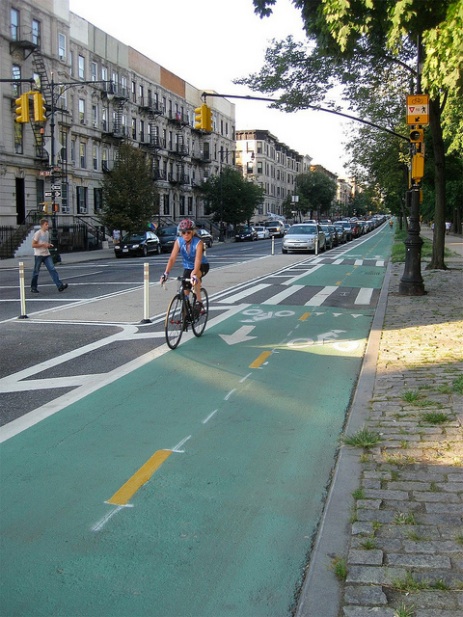 Prospect Park’s new bike lane is worse than airborne weaponized AIDSPhoto: shannonvsimmsIn staunchly liberal enclaves all over the country, citizens who profess to progressive environmentalism in the abstract are thwarting local efforts to increase the sustainability of their immediate environment. Whether it’s suing over bike lanes in Park Slope, Brooklyn, or blocking a bus rapid transit system in Berkeley, Calif., the children of the summer of love appear to have grown up, grown old, and grown immune to the needs of their descendants.
Prospect Park’s new bike lane is worse than airborne weaponized AIDSPhoto: shannonvsimmsIn staunchly liberal enclaves all over the country, citizens who profess to progressive environmentalism in the abstract are thwarting local efforts to increase the sustainability of their immediate environment. Whether it’s suing over bike lanes in Park Slope, Brooklyn, or blocking a bus rapid transit system in Berkeley, Calif., the children of the summer of love appear to have grown up, grown old, and grown immune to the needs of their descendants.
Ryan Avent, online economics editor for The Economist, says that there is something even more damaging to the environment than efforts to block sustainability initiatives within cities. Perhaps without even realizing it, city dwellers are pushing to keep their neighborhoods expensive and inaccessible by preventing new dense, vertical real estate development within them:
Bike lanes make New York City a teeny bit greener. But New York is already much, much greener than most American cities, thanks to its dense development pattern and extensive transit network. Net emissions fall a lot more when someone from Houston moves to New York than when someone from New York starts biking.
By preventing highrises and putting whole neighborhoods off limits for historical reasons, residents of America’s most beloved cities are in effect pricing others out of those cities. This means more sprawl on the outskirts, more transit by car and a higher average per capita carbon footprint for everyone.
The psychology of this opposition isn’t complicated: humans are herd animals, and it’s not exactly mainstream yet to recognize that it might run counter to our environmental ideals to say “Not in My Back Yard” to development and alternative transport.
Read more:
“Green Development? Not in My (Liberal) Backyard,” The New York Times
“Liberal NIMBYs,” The Bellows
“Will preservation be a tool of blatant anti-development?” Greater Greater Washington



